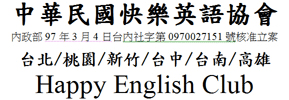網站 http://www.happyforum.org/ 歡迎超連結並轉寄網址
論壇 http://www.happyforum.org/happy/ 歡迎至論壇討論
Time:第 53 次例會,2006年4月29日(週六)下午3~5點
Place: viewtopic.php?t=15
15:00~16:00 Gossiping and chatting
16:00~17:00 Topic discussion
Host: Annie Chung
Assistant Host: Dirk Bremann
Topic:On Time
(Source: Studio classroom)
An office meeting starts at 10 p.m. Hans, a German colleague, is already waiting at 9: 55. Nathan, an American, arrives on the dot at 10. In the next five minutes a few others hurry in. But trying everyone’s patience is the visitor from Brazil, Raul, who walks in at 10:30. He doesn’t even think he’s late.
How people perceive time varies around the world. Germans like arriving early. Americans plan to arrive just on time. Brazilians aren’t bothered by being a half hour late. And many don’t know exactly what time it is.
In 1884, a clock in Greenwich, England, set the standard time around the world. But it could standardize when people will arrive for 10 a.m. meeting.
While cultural attitudes about time differ greatly, all cultures can be put into one of two groups: time-oriented and event-oriented. Schedules take precedence in time-oriented cultures. In event-oriented cultures, what happens is more important than when. Such cultural knowledge is important for world travelers. Understanding how people perceive time can help travelers get along better in foreign cultures.
Time-Oriented cultures
The Western world, particularly North America and Western Europe, is strongly time-oriented. Events take place at specific, scheduled times. Appointments are kept to the minute, with perhaps a five-minute leeway.
In time-oriented cultures, time is linear and limited. Imagine time as a conveyor belt carrying boxes past. Each box represents a segment of time. One must pack as much as possible into each box before it slips in to the past. Time must be “managed” well-otherwise it may get “wasted”. And anywhere, people are “running out” of time.
Event-oriented cultures
In event-oriented cultures, meetings begin when everybody arrives and finish when all the business is done. Events are scheduled to begin “after dinner” or simply “tomorrow” This laid-back lifestyle characterizes people in Arab, African, Latin American and Southeast Asian countries.
Here, time is cyclical and unlimited. It begins anew every day, following the motion of the sun. Because time is unlimited, people in event-oriented cultures tend to value relationships more. Schedules quickly get set aside for a friend in need or even just met on the street.
Cross-cultural conflicts
Not understanding these different ideas about time can create conflicts between people of different cultures. For example, American students often quickly exchange “how are you?” and “fine” as they rush to make class on time. But event-oriented students see this exchange as impersonal. Before they can say anything more than “fine,” the American student has already hurried past them.
Time-oriented people doing business in event-oriented lands may cut to the chase too quickly. This offends event-oriented people, who prefer getting to know their associates before discussing the details of a business deal.
For those who believe “time is money,” the slow pace of life in event-oriented lands can be frustrating. Since time-oriented people value productivity, they might view event-oriented people as lazy or inefficient.
Not having specific times for events also causes problems. Some Americans in Mexico were told a meeting would “start after dinner.” They rushed through dinner so they could be on time, only to end up waiting for everybody else.
What can the world traveler so to avoid these time-related conflicts? Follow the age-old rule: When in Rome, do as the Romans do.
Let's discuss...
1. Based on the descriptions in the article, do you think your culture is time-oriented or event-oriented? Give specific examples to support your idea.
2. What do you think is a benefit of being time-oriented? What is a benefit of being event-oriented?
3. Have you ever experienced a conflict that happened because people had different ideas about time? What happened?
4. Do you tend to be time-oriented or event-oriented? Give specific experience to show your attitude toward time.
5. How do you think of "On Time"? Do you think it is necessary for our society to be punctual anytime? Why or why not? Give reasons to support your idea.
參與例會,請自行列印當週的討論文章並帶至現場,圖示如下:

http://www.happyforum.org/
台北,每週六 (2005年6月起)
Taipei, Saturday, Weekly
from June, 2005
Place:
viewtopic.php?t=15

高雄,每月最後一個週日 (2007年4月起)
Kaohsiung, Final Sunday, Monthly
from April, 2007
Place:
viewtopic.php?t=15











